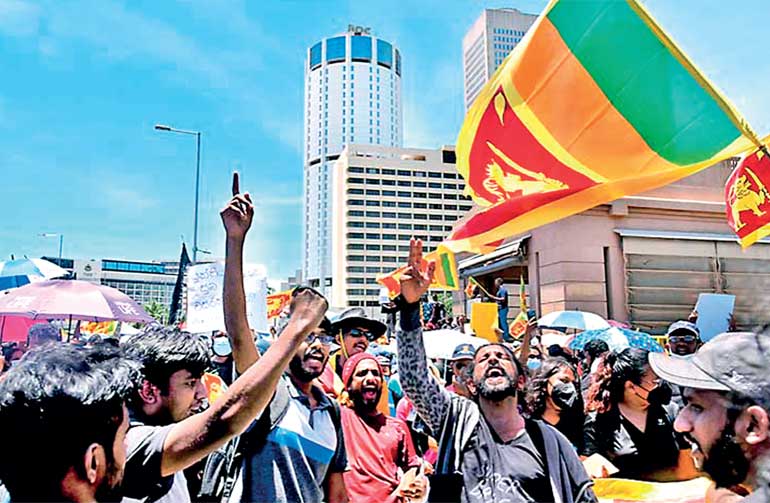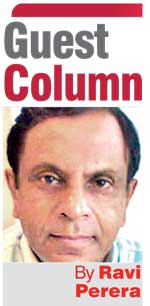Monday Feb 16, 2026
Monday Feb 16, 2026
Thursday, 1 September 2022 00:13 - - {{hitsCtrl.values.hits}}

If the ‘Aragalaya’ is to have any meaning, while throwing the entire leadership lock, stock and barrel to the dustbin of history, we must also throw away our own former selves, our accustomed way of thinking and working; that half-baked quality, inefficiency and the incompetence which now seem to define this nation
“Those who are able to see beyond the shadows and lies of their culture will never be understood, let alone believed, by the masses” – Plato
“Just as it is not religion which creates man, but man who creates religion, so it is not the constitution which creates the people, but the people which creates the constitution”
– Karl Marx – Contribution to the Critique of Hegel’s Philosophy of Law
 By its reach and impact, the ongoing ‘Aragalaya’ (struggle) could justifiably claim a unique place in the history of this country. We have not witnessed a political phenomenon replete with this potentiality in our times; not at any election, not in any social convulsion. And, we have had these aplenty, so many elections since 1948, and nearly every decade, deeply wounding upheavals; ethnic wars, insurgencies; in their different ways, expressions of bitter disapproval of the status quo.
By its reach and impact, the ongoing ‘Aragalaya’ (struggle) could justifiably claim a unique place in the history of this country. We have not witnessed a political phenomenon replete with this potentiality in our times; not at any election, not in any social convulsion. And, we have had these aplenty, so many elections since 1948, and nearly every decade, deeply wounding upheavals; ethnic wars, insurgencies; in their different ways, expressions of bitter disapproval of the status quo.
We live in an exceedingly inter-connected world, with countries competing in every field; pitting their cultural attitudes, leadership quality, skills, stamina and the necessary resources against each other. Adding greater focus to comparative progress, we live in Asia, home to many countries which starting from a low base, have in a period of less than two decades, turned themselves into economic dynamos. Our nation story is very different. The 70 plus years since independence is long enough to provide historical perspective to Sri Lanka’s evolution, the many elections held, the various governments installed, and the attendant consequences thereof.
How a country is led is the responsibility of its elected governments. One does not need an acute critical faculty to realise the appalling incapacity of our leadership; a governance with a repeating theme; beginning with much fanfare, proceeding with big talk and buffoonery, only to eventually end in abysmal failure. While we flounder, every other country in the neighbourhood has overtaken us! This monumental incompetence is broken only by periodic convulsions; ethnic, religious, economic or some other grievance leading to bloody challenges to the legitimacy of the rulers; young rebels eventually meeting a tragic end at the hands of young soldiers, all of this little island.
It is extremely unusual for a purported democracy to be rocked by so many armed rebellions of its own people. After all, a democratic system, particularly, the electoral method, is designed to represent the popular will, to minimise disaffection, ensure fairness and obviate the need for violent agitation. Why divide against itself, when the system, in the immortal words of Abraham Lincoln is a – “A government of the people, by the people, for the people”?
Clearly, something is amiss, there is an undiagnosed malaise affecting the social order.
We cannot claim historical ownership to a single system or idea which go to form our overall governance structures. They, the parliament, the police, the press; are all imported concepts, having originated and gradually solidified in cultures and climes vastly different. What we have is a huge mimic of something alien, a second-rate aping of ideas imperfectly understood. Obviously, they struggle in the unfavourable environment, often ending up as a grotesque caricature of the original.
The first Prime Minister of the United Kingdom is said to be Sir Robert Walpole whose position as the First Lord of the Treasury (1721-1742) gradually evolved, due to various historical reasons, to that of the Prime Minister. We can assume that Walpole conducted himself in such a manner that there was no clamour in England to do away with this office! (Compare with the poor reputation of Sri Lanka’s hybrid presidency, the brainchild of J.R. Jayewardene, often given sage like status by his admirers – after every incumbency, there is a renewed demand to do away with the presidency! So much for our institution building!)
Walpole’s career was not without blemishes, however, after him the office of the Prime Minister became established in the United Kingdom, evolving through the years. Today, the office of the Prime Minister is the most powerful position in the Kingdom.
As a gesture of gratitude for his long years of service, King George 11 offered No. 10, Downing Street as a gift to him. But Robert Walpole refused it as a personal gift, insisting that it becomes the official residence of the First Lord of the Treasury. Thus, No. 10 Downing Street became one of the most famous addresses of the world.
Robert Walpole’s family who were members of the Whig Party did not claim a lease on the office of the Prime Ministership. The Conservative Party (originally Tory Party) had Robert Peel as their first Prime Minister (1834) while much later, in early 20 Century, Ramsay MacDonald became the first Labour Party Prime Minister. Neither the Conservative Party nor the Labour Party became fiefdoms of these leaders.
It seems English eyes view public office very differently.
As played out since 1948, Sri Lankan Elections can only confirm which set of undesirables get the baton next. The political parties are in the firm grip of a few individuals/families, who when the elections come up, offer themselves as candidates to lead the country. One of the families will inevitably win, name themselves the leaders of the nation; express many profound thoughts, start all kinds of projects, address many international conferences; eventually they too will fail, as they must. Given their make-up, it will be against laws of nature if they succeed. They are rejected at the next election, only to offer themselves again and yet again for leadership.
This domination by a few hyped-up opportunists is not only limited to political parties, even in the commercial sphere most companies are by and large led by former students of one or two schools. These are the same schools that produce the leading politicians of the country. Either the students attending these few schools become natural leaders by some mysterious process, or, there is something very unwholesome operating in this country of 22 million people.
Although there is a tendency to equate the few thousands inchoate, leaderless group of protestors camped out at the Galle Face Green as the ‘Aragalaya’, the concept commands a meaning which runs through the entire spectrum of this society; across all economic, ethnic, religious definitions; in fact, any citizen who has even a semblance of social awareness, is in the ‘aragalaya’ today.
They should be. After 70 plus years of tomfoolery by this so called elite, the country is bankrupt, its economy in disarray, its currency in free fall, its passport a liability; not only have lives of the people become impossibly hard, even the future of their children has been blighted; what is there to hold them back?
“Who killed Cock Robin “the famous nursery rhyme is said to be a reference to the political fall of Sir Robert Walpole. The origin of the question “who killed Cock Robin”, however is lost in the misty past, going to a period even before Walpole. There is no uncertainty as to who killed the Sri Lankan economy. There are but a few in the dock, perhaps two dozen or so high level decision makers holding office after independence, some fancying themselves as economic wizards, even now presenting themselves as the redeemers.
Ultimately, we must accept the truism that the people get the governments they deserve. In Sri Lankan eyes, until this collapse, there was nothing wrong with our leaders; in fact, if you go by the common media, we have some remarkable leaders. The outside world may scoff at them, consider them poseurs out of depth, but to our purblind voter, here on the Sri Lankan political stage was something magnificent.
Year 2022 was the turning point. The temple they had worshipped for long was shown to be only a den of thieves, the officiating priests were unmasked, and all their rituals were only tricks to retain power, remain in control and make money. Upon learning the truth, the people seethed, ashamed of themselves for being such dupes.
If this nation is to have a future, if it is to mean anything in the world, this is the time to be reborn, become different; become strong, become able.
To condemn the miserable leaders the country has been burdened with, is the most natural reaction to our plight. These so called leaders had not only made all the wrong decisions, they corrupted all systems and subverted vital institutions, including political parties. There was no social resistance, the people were weak and deficient. And, that suited the leadership.
If the ‘Aragalaya’ is to have any meaning, while throwing the entire leadership lock, stock and barrel to the dustbin of history, we must also throw away our own former selves, our accustomed way of thinking and working; that half-baked quality, inefficiency and the incompetence which now seem to define this nation.
The known, the familiar environment in which we function, may not be valid any longer.
There is this entrepreneur friend of mine who not so long ago started a large hotel and restaurant. To push the new business forward he organised many promotions at the hotel. One year he held an “Oktoberfest” to coincide with the popular German beer festival. Sparing no effort to make it authentic, he even brought down a band of musicians and a Chef from Germany for the occasion.
On examining the kitchen, the German Chef refused to work in it, saying that its cleanliness was far below the standards he expects when serving the public. They got to work, the staff led by the German Chef were down on their hands and knees scrubbing and cleaning the kitchen an entire day. It was a relatively new kitchen, until that day no one had realised how much cleaning it needed. There were two standards of cleanliness operating. To my friend, this was an eye-opener.
We see the limitations, failings and the corruptions of our leaders. Whether our own failings are as obvious, is not certain. Clearly, in capabilities, efficiencies and standards there is much to be desired.
This ‘Aragalaya’, is a desperate demand for a fresh beginning, a new Sri Lankan to emerge. And that, is sure to prove the most difficult ‘aragalaya’ of all.